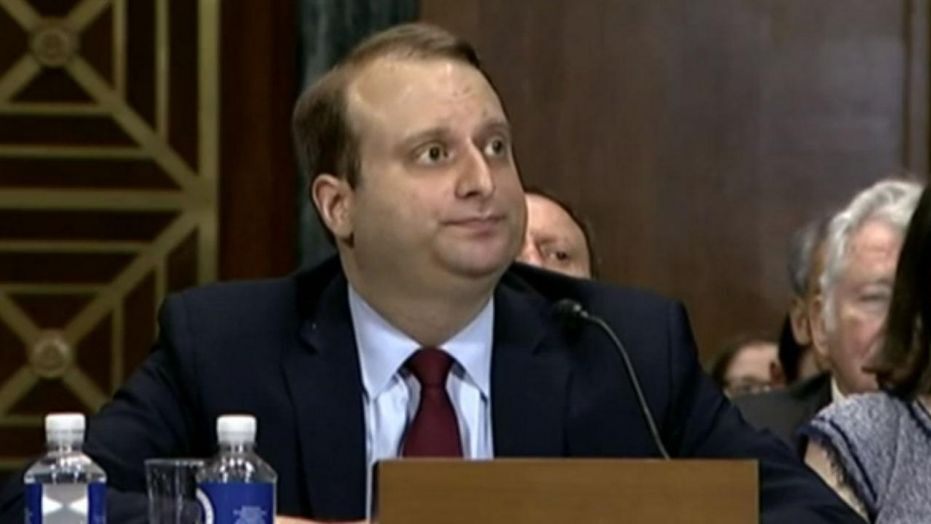The Senate Judiciary Committee held a confirmation hearing today for Steven Menashi, one of President Trump’s most controversial nominees for a lifetime seat on a U.S. appeals court.
It didn’t go that well.
Republicans and Democrats castigated Trump’s nominee to the powerful Second Circuit Court of Appeals for dodging their questions as well as his prior controversial writings.
Senate Judiciary Chairman Lindsey Graham (R-S.C.) in particular chided Steven Menashi for not being more forthcoming during his confirmation hearing after the nominee wouldn’t provide specifics on how or if he helped shape Trump’s immigration policy.
Menashi is currently associate counsel to the president.
In the weeks leading up to his confirmation hearing, liberal judicial groups railed against Menashi for his earlier writings, highlighting his comments on “ethnonationalism.”
Graham criticized Menashi for his editorial in the New York Sun on trial lawyers that the senator said suggested that such lawyers took advantage of the public.
“You said something about trial lawyers that I particularly don’t like,” said Graham, who asked Menashi if he had ever represented a client in court. Graham cited his own experience as a plaintiff’s lawyer and said that he “didn’t have time to do frivolous lawsuits.”
Menashi responded that the editorial was written before he went to law school and “should not be seen as representative of [his] views as an attorney.”
Graham further questioned Menashi’s writings, referring to an article he wrote for the University of Pennsylvania Journal of International Law about ethnonationalism and the State of Israel and asked whether he understood “why we respect other people’s faiths in America.”
Menashi said he merely intended to point out “that many states that are well known as liberal democracies have a linguistic or ethnic basis” and that “Israel was not out of the norm.”
Some of the most heated moments in the hearing took place when senators grilled Menashi about his work for the White House. Menashi, for the most part, refused to provide many details.
“I’m just asking if you have worked or advised on the administration’s policy of separating families at the border,” asked Sen. Dianne Feinstein (D-Calif.), the committee’s ranking member. “I’m not asking what, just whether you’ve done it.”
Graham even came to Feinstein’s defense after Menashi responded briefly to similar questions from Republican Sen. Josh Hawley of Missouri.
“Mr. Menashi we’re not going to do this, you’re not going to answer his questions and not answer hers,” Graham said.
After Sen. Dick Durbin (D-Ill.) described the hearing as a “worthless exercise,” Graham advised Menashi to be more forthcoming and said that Democrats were only asking him questions about narrow subject matters.
Sen. John Kennedy (R-La.) also voiced frustration with Menashi after the senator asked a hypothetical question about school shootings and social media, as well as his views on the Bill of Rights.
“Counsel, you’re a really smart guy but I wish you’d be more forthcoming,” Kennedy told Menashi. “This isn’t supposed to be a game, we’re supposed to try to understand not how you’re going to rule but how you’re going to think.”
When Menashi offered to be more open, Kennedy said he was out of time and Menashi “took a lot of it by not answering my questions.”
Following his confirmation hearing, Senate Minority Leader Chuck Schumer (D-N.Y.) and Sen. Kirsten Gillibrand (D-N.Y.) lambasted Menashi, citing a “long, disturbing record,” called his views “outside the judicial mainstream” and criticized his work as a lawyer at the Department of Education under Secretary Betsy DeVos.
“As the top lawyer at the Department of Education, he played a critical role in executing Secretary DeVos’s agenda to make it harder for campus sexual assault victims to seek justice, provide federal funding to schools that discriminate against LGBTQ students, roll back civil rights investigations, and undermine critical protections for student borrowers who were defrauded by their institutions,” Schumer and Gillibrand in a joint statement.
Both Schumer and Gillibrand did not return blue slips for Menashi’s nomination.
Menashi had a few Republican allies during his confirmation hearing. Sen. Mike Lee (R-Utah) introduced the nominee and praised him for his credentials, which include a degree from Stanford Law School and a stint clerking for Supreme Court Justice Samuel Alito. Hawley expressed sympathy for the media scrutiny Menashi faced over his writings.
Prior to his hearing, CNN reported that as a student at Dartmouth, Menashi criticized “Take Back the Night” marches that intend to draw awareness to and stop sexual violence against women.
In his writings, Menashi said that such marches “charge the majority of male students with complicity in rape and sexual violence (every man’s a potential rapist, they say; it’s part of the patriarchal culture),” and argued there’s “no similar leeway for men.”
MSNBC’s Rachel Maddow also highlighted his article on ethnonationalism.
The Judicial Crisis Network, a conservative judicial group, came to Menashi’s defense. Prior to the hearing, Carrie Severino, the group’s chief counsel said Menashi will be “an outstanding judge” and expressed confidence he would be confirmed.
Progressive groups are opposed to Menashi’s nomination because of his long record of opposing and undermining equality for communities of color, women and LGBTQ people.
